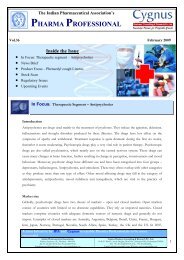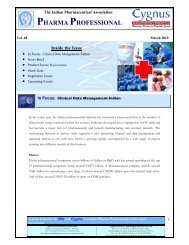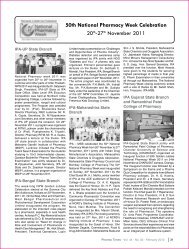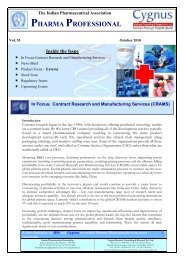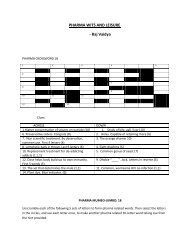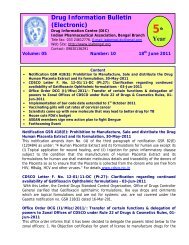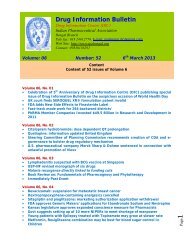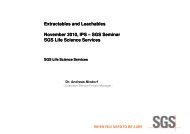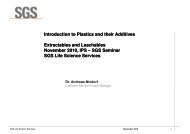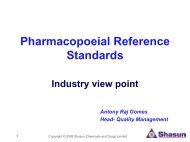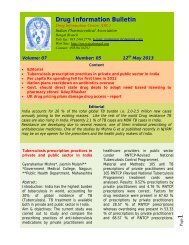Congenital Defect in Drugs and Cosmetics Act 1940 - Indian ...
Congenital Defect in Drugs and Cosmetics Act 1940 - Indian ...
Congenital Defect in Drugs and Cosmetics Act 1940 - Indian ...
You also want an ePaper? Increase the reach of your titles
YUMPU automatically turns print PDFs into web optimized ePapers that Google loves.
Article<br />
<strong>Congenital</strong> <strong>Defect</strong> <strong>in</strong> <strong>Drugs</strong> <strong>and</strong> <strong>Cosmetics</strong> <strong>Act</strong> <strong>1940</strong><br />
B.L.Dass 1 , R.N.Gupta 1 , A.K.Dorle 2<br />
1<br />
Birla Institute of Technology, Ranchi, 2 Nagpur University, Nagpur<br />
<strong>Drugs</strong> & <strong>Cosmetics</strong> <strong>Act</strong> was <strong>in</strong>troduced <strong>in</strong> our country <strong>in</strong> <strong>1940</strong><br />
to regulate sale, distribution, manufacture, import etc., of drugs.<br />
On see<strong>in</strong>g the reasons for its <strong>in</strong>ception, several factors have<br />
been revealed. Industrial commission appo<strong>in</strong>ted by British- India<br />
Government <strong>in</strong> 1918 stated that adulteration of <strong>Drugs</strong> reached such<br />
a position <strong>in</strong> India that it was doubtful that an <strong>Act</strong> could curb it 1 .<br />
Certa<strong>in</strong> events took place <strong>in</strong> British–India Legislative Assembly <strong>and</strong><br />
outside Assembly <strong>in</strong> between 1920 <strong>and</strong> <strong>1940</strong> regard<strong>in</strong>g objective<br />
of Government beh<strong>in</strong>d the enactment of “<strong>Drugs</strong> <strong>Act</strong>, <strong>1940</strong>”.<br />
On 19 th March 1921, Lieutenant Colonel H.A.J. Gidney<br />
(Nom<strong>in</strong>ated; Anglo –<strong>Indian</strong>s Member ) <strong>in</strong>troduced a motion <strong>in</strong> the<br />
British -India Legislative Assembly, <strong>in</strong> which, it was stated that<br />
there were many Sub-st<strong>and</strong>ard drugs be<strong>in</strong>g imported <strong>in</strong> India, <strong>and</strong><br />
therefore it moved to impose a 20 percent extra taxation on the<br />
import of certa<strong>in</strong> dishonest quack drugs.<br />
Six years later, on the 9 th of March 1927, the Honorable Sir<br />
Haroon Jaffer moved a Resolution <strong>in</strong> the Council of State to<br />
recommend the Governor-General <strong>in</strong> Council to take immediate<br />
measures to control the craze for sub-st<strong>and</strong>ard drugs by a legislation<br />
hav<strong>in</strong>g provision for st<strong>and</strong>ards of drugs. He po<strong>in</strong>ted out that the<br />
market was flooded with drugs <strong>and</strong> chemicals of defective strength<br />
<strong>and</strong> impure quality <strong>and</strong> those potent remedies like sera <strong>and</strong> vacc<strong>in</strong>es<br />
were be<strong>in</strong>g freely sold to the public, without their quality be<strong>in</strong>g tested.<br />
He characterized the practice as a great menace to the public health<br />
<strong>and</strong> called for the prompt <strong>in</strong>tervention of the State by <strong>in</strong>stitution of<br />
efficient safeguards, to ensure the quality; <strong>and</strong> the authenticity of<br />
the medic<strong>in</strong>al preparations offered for sale; to the public.<br />
The discussion followed a general consensus of op<strong>in</strong>ion <strong>in</strong> favor<br />
of a comprehensive “<strong>Act</strong>” to regulate the sale <strong>and</strong> manufacture<br />
of drugs <strong>in</strong> country <strong>in</strong>clud<strong>in</strong>g the provision for st<strong>and</strong>ardization of<br />
drugs <strong>and</strong> the assay of sera <strong>and</strong> vacc<strong>in</strong>es. The Council of State<br />
eventually adopted the Resolution <strong>in</strong> the follow<strong>in</strong>g terms: (<strong>Drugs</strong><br />
Enquiry Committee 1930)<br />
“This council recommends to the Governor-General <strong>in</strong><br />
Council to urge all Prov<strong>in</strong>cial Governments to take such<br />
steps as may be necessary to control the <strong>in</strong>discrim<strong>in</strong>ate use<br />
of medic<strong>in</strong>al drugs <strong>and</strong> to legislate for the st<strong>and</strong>ardization of<br />
the preparation” 2 .<br />
On 4 th September, 1928 Leut.– Col. H.A.J. Gidney moved<br />
an adjournment motion on a gigantic Qu<strong>in</strong><strong>in</strong>e Fraud, <strong>in</strong> British<br />
India Parliament. While mov<strong>in</strong>g the adjournment motion he said;<br />
(Proceed<strong>in</strong>gs L.A. 1928.)<br />
“Sir, I rise to ask your permission that this House do<br />
adjourn with a view to consider certa<strong>in</strong> facts relat<strong>in</strong>g to the<br />
gigantic qu<strong>in</strong><strong>in</strong>e fraud that is today the people of India are<br />
be<strong>in</strong>g perpetrated throughout the length <strong>and</strong> breadth of India<br />
<strong>and</strong> to which the people of India are be<strong>in</strong>g subjected…..It<br />
is most terrible fraud that has been ever perorated on this<br />
country <strong>and</strong> the unrestricted sale of this spurious drug has, I<br />
submit, been largely responsible for the steady high mortality<br />
from malaria” 3 .<br />
He further spoke <strong>in</strong> the same debate: (Proceed<strong>in</strong>gs L.A.<br />
1928).<br />
“Because there is no <strong>Drugs</strong> Adulteration <strong>Act</strong> <strong>in</strong> India,<br />
acts which even Egypt, Palest<strong>in</strong>e Mesopotamia possess.<br />
(An Honorable Member: “Who makes that qu<strong>in</strong><strong>in</strong>e?”) This<br />
spurious preparation of qu<strong>in</strong><strong>in</strong>e is manufactured <strong>in</strong> Engl<strong>and</strong><br />
<strong>and</strong> Germany <strong>and</strong> other places of Europe…..” 3<br />
All these could not attract attention of the Government because<br />
on political front the Government was <strong>in</strong> trouble, adjust<strong>in</strong>g the after<br />
effects of First World War. The <strong>in</strong>dependence movement <strong>and</strong><br />
Satyagrah, Swadesi movement, kept the Government busy on<br />
that front. The British India Government neither had <strong>in</strong>tention to<br />
do someth<strong>in</strong>g for the welfare of the people nor had it the time for<br />
same. It awoke <strong>and</strong> became worried, when the bus<strong>in</strong>ess <strong>in</strong>terest<br />
of British Pharmaceutical Company came <strong>in</strong> danger, due to import<br />
of drugs <strong>in</strong>to India from countries other than Brita<strong>in</strong>. Therefore,<br />
they wanted to have some sort of Government control on import<br />
of drugs <strong>in</strong> India. There were no st<strong>and</strong>ards def<strong>in</strong>ed for the drugs<br />
<strong>and</strong> no legislation existed to control the menace of adulterated <strong>and</strong><br />
spurious drugs. This peculiar situation resulted <strong>in</strong> supply of grossly<br />
sub-st<strong>and</strong>ard, cheap medic<strong>in</strong>e <strong>in</strong> the market. The cry <strong>in</strong> press put<br />
the Government <strong>in</strong> great embarrassment.<br />
Honorable Member of the House (British –India Assembly)<br />
Shri P<strong>and</strong>it Laxmi Kant Moitra, spoke <strong>in</strong> the Assembly, on 4 th April<br />
<strong>1940</strong>, while discussion on the “<strong>Drugs</strong> Bill” gave valuable <strong>in</strong>formation<br />
regard<strong>in</strong>g the reasons of <strong>in</strong>troduc<strong>in</strong>g <strong>Drugs</strong> <strong>Act</strong> <strong>in</strong> the Legislative<br />
Assembly. (Proceed<strong>in</strong>gs L.A. <strong>1940</strong>).<br />
“There is a chequered history beh<strong>in</strong>d the Bill to which<br />
some reference has been made but from which have been<br />
drawn entirely different consciences. Sir, as far back as 1927 <strong>in</strong><br />
response to the strong <strong>in</strong>sistent dem<strong>and</strong> of the public to have a<br />
legislative measure to control of import, manufacture <strong>and</strong> sale<br />
of drugs <strong>in</strong> this country, a Resolution was passed <strong>in</strong> the Council<br />
of State. People expected that Government would forthwith<br />
take steps to implement the Resolution. Noth<strong>in</strong>g was done.<br />
Three long years rolled by <strong>and</strong> <strong>in</strong> 1930 an <strong>in</strong>cident occurred; an<br />
<strong>in</strong>cident which was of tremendous significance to the country,<br />
to the medical profession <strong>and</strong> to the trade of drugs. There<br />
was the withdrawal of recognition of <strong>Indian</strong> medical degrees<br />
by the Medical Council of Great Brita<strong>in</strong>, <strong>and</strong> consequently,<br />
there was keenest resentment <strong>in</strong> this country, particularly <strong>in</strong><br />
the medical profession as well as <strong>in</strong> the trade of drugs. Sir, a<br />
regular movement was started <strong>in</strong> this country with a political<br />
complexion; a movement which was sponsored by the leaders<br />
of medical profession all over India, <strong>in</strong>clud<strong>in</strong>g personages like<br />
Dr. Sir Nilratan Sarcar, Dr. P.C. Roy, Dr. Deshmukh, Dr. Mehta<br />
<strong>and</strong> Dr. Mudaliar. The cry was that the least India could do to<br />
v<strong>in</strong>dicate her national honor <strong>and</strong> self respect was to boycott<br />
British drugs <strong>and</strong> medic<strong>in</strong>al preparations <strong>and</strong> to take to <strong>Indian</strong><br />
manufactured drugs from the countries other than Brita<strong>in</strong>.<br />
Sir, the movement began to gather volume <strong>and</strong> momentum.<br />
Government suddenly woke up <strong>and</strong> thought that they also <strong>in</strong><br />
their turn should do someth<strong>in</strong>g to counteract the agitation <strong>and</strong><br />
forthwith appo<strong>in</strong>ted the <strong>Drugs</strong> Enquiry Committee with Col.<br />
Chopra as its President….” 4<br />
*Email Id: roopgupta@sify.com<br />
Pharma Times - Vol. 44 - No. 05 - May 2012 41
The same hypothesis was also forwarded by Chopra Committee<br />
itself. The Report stated <strong>in</strong> its paragraph 34.<br />
“Although, as already <strong>in</strong>dicated, the appo<strong>in</strong>tment of the<br />
Committee was the <strong>in</strong>evitable outcome of the pressure brought<br />
to bear on the Government from different quarters, the motives of<br />
the Government were questioned <strong>and</strong> the Committee itself was<br />
viewed with suspicion when it was actually constituted. The distrust<br />
found expression <strong>in</strong> the columns of a section of the press. The<br />
appo<strong>in</strong>tment of the Committee unfortunately synchronized with a<br />
period of <strong>in</strong>tense political unrest <strong>in</strong> India.<br />
Above facts, reveal the situation prevail<strong>in</strong>g <strong>in</strong> 1930, when<br />
Chopra Committee was put <strong>in</strong> action. It was also stated that the<br />
British India Government was fac<strong>in</strong>g multidimensional, problems,<br />
at that time. In short it can be enlisted as;<br />
1. Public cry over dearth of quality medic<strong>in</strong>es <strong>in</strong> market.<br />
2. Resentment <strong>in</strong> medical professionals, on derecogniz<strong>in</strong>g Medical<br />
Degree of India by British Medical<br />
Council.<br />
3. Urgent need to recapture <strong>Indian</strong> market after trauma of First<br />
World War.<br />
4. To counter Swadeshi Movement <strong>in</strong> India.<br />
The appo<strong>in</strong>tment of Chopra Committee was a measure of<br />
British Government to resolve the above problems. The Chopra<br />
Committee submitted its report <strong>in</strong> 1931. The Report recommended<br />
for a comprehensive legislation to regulate import, manufacture<br />
<strong>and</strong> sale of modern <strong>and</strong> <strong>in</strong>digenous drugs. It has also enlisted<br />
the ma<strong>in</strong> provisions of the <strong>Act</strong>. It is supposed as prototype of the<br />
“<strong>Drugs</strong> <strong>Act</strong>, <strong>1940</strong>”.<br />
Time Selection for <strong>in</strong>troduction of “<strong>Drugs</strong> Bill”<br />
The Government put the Copra Committee Report <strong>in</strong> the cold<br />
storage. In 1935 “Devolution <strong>Act</strong>” came <strong>in</strong>to effect. The affairs of<br />
health were put <strong>in</strong> the list of States. Most of the State governments<br />
were led by the Congress Party. The credit of positive work on health<br />
would have gone to the Congress Party. Neither it was acceptable<br />
to the British-India Government nor did the Central Government<br />
have <strong>in</strong>tension to deliver good to the people of India.<br />
After six years of submission of the Chopra Committee Report, <strong>in</strong><br />
1937, the Government placed a bill to regulate the “Import of <strong>Drugs</strong>”<br />
<strong>in</strong>to the Assembly as its prime concern was only to facilitated import<br />
of drugs from Brita<strong>in</strong>. It created big cry <strong>and</strong> resentment amongst<br />
the people of India. The Assembly did not accept it <strong>and</strong> dem<strong>and</strong>ed<br />
for comprehensive bill to regulate import, manufacture <strong>and</strong> sale of<br />
drugs <strong>in</strong>stead of a partial implementation of the Chopra Committee<br />
recommendations. The Government of India withdrew “<strong>Drugs</strong><br />
Import Bill” <strong>in</strong> 1937 with a promise to re-<strong>in</strong>troduce a comprehensive<br />
bill. Aga<strong>in</strong> it was put <strong>in</strong>to cold storage. Second World War broke<br />
<strong>in</strong> August 1939. All state Governments, led by <strong>Indian</strong> National<br />
Congress resigned <strong>in</strong> October 1939 due to participation of British-<br />
India <strong>in</strong> war. The war made transportation of goods from Europe<br />
to India difficult. In this situation British Pharmaceutical Houses<br />
became desperate to save their <strong>in</strong>dustry <strong>and</strong> export earn<strong>in</strong>gs. As the<br />
State Government did not exist, <strong>and</strong> peoples’ attention was fixed on<br />
war, the British Government found it a right time to <strong>in</strong>troduce “DRUG<br />
BILL” <strong>in</strong> Legislative Assembly. The time warranted the Government<br />
to get the bill passed by the House, with official majority <strong>in</strong> House,<br />
as the elected members of the house had resigned. It had served<br />
tw<strong>in</strong> purpose of the Government of India;<br />
1 It was an effort to safeguard the export of Pharmaceuticals from<br />
Brita<strong>in</strong> to India.<br />
2 It projected the British India Government as welfare<br />
Government.<br />
This proposition f<strong>in</strong>ds enough strength from the conviction of<br />
Honorable Member of the Assembly while speak<strong>in</strong>g on the “<strong>Drugs</strong><br />
Bill” <strong>in</strong> The Assemble on 5th <strong>and</strong> 6 th , April <strong>1940</strong>.<br />
Honorable Members of the British India Legislative Assembly<br />
Shri P<strong>and</strong>it Lakshmi Kant Maitra, spoke <strong>in</strong> the Legislative Assembly,<br />
dur<strong>in</strong>g the discussion of the Bill on 5 th April <strong>1940</strong>; (proceed<strong>in</strong>gs<br />
L.A. <strong>1940</strong>).<br />
“…….My Honorable friend appealed that this Bill should not<br />
be treated as a controversial measure. But, Sir, when we consider<br />
the history of this legislation, <strong>and</strong> the fact that the representatives<br />
of various <strong>in</strong>terests concerned were not even shown the formal<br />
courtesy of consultation, <strong>and</strong> the way <strong>in</strong> which it is sought to be<br />
passed by this House, it raises <strong>in</strong> us the strongest suspicion that it<br />
is not the purity or geniuses of drugs that is sought to be secured<br />
by this Bill, but it is the import from other countries of under-strength<br />
stuff that is go<strong>in</strong>g to be legalized <strong>and</strong> helped…” 6 .<br />
The above mentioned facts revealed the reasons for <strong>in</strong>sertion<br />
of the “<strong>Drugs</strong> <strong>and</strong> <strong>Cosmetics</strong> <strong>Act</strong> <strong>1940</strong>” clearly. The lack of<br />
determ<strong>in</strong>ation of the <strong>Act</strong> to eradicate menace of spurious <strong>and</strong><br />
sub-st<strong>and</strong>ard drugs resulted the weak provisions <strong>in</strong> the “<strong>Act</strong>” to<br />
punish the unscrupulous traders <strong>and</strong> manufacturers of drugs. Due<br />
to this congenital defect the “<strong>Act</strong>” lost the deterrence. It is noted<br />
that even after much amendments still the dealer <strong>and</strong> manufacturer<br />
were <strong>in</strong>volved <strong>in</strong> bad practices s<strong>in</strong>ce most of times they were be<strong>in</strong>g<br />
acquitted. So it requires further strict regulations <strong>and</strong> its compliance<br />
to control the menace of Sub-st<strong>and</strong>ard <strong>and</strong> Spurious drugs.<br />
Reference:<br />
1. Report of the <strong>Drugs</strong> Enquiry Committee 1930-1931: paragraph<br />
492: page173.<br />
2. <strong>Drugs</strong> Enquiry Committee Report, 1030-30:Chapter I; Page 1.<br />
3. Legislative Assembly: 4 th September 1928; page 154.<br />
4. Legislative Assembly: 4 th April: <strong>1940</strong>; page 2198.<br />
5. <strong>Drugs</strong> Enquiry Committee Report 1930-31: Section I chapter IV<br />
paragraph 34.<br />
6. Legislative Assembly: 5 th April: <strong>1940</strong>; page 2212.<br />
PRODUCT LAUNCHES<br />
Cipla <strong>and</strong> DNDi <strong>in</strong>troduce FDC of Artesunate + Mefloqu<strong>in</strong>e<br />
to fight P.falciparum malaria<br />
news.<strong>in</strong>diamart.com<br />
Cipla <strong>in</strong> association with <strong>Drugs</strong> for Neglected Diseases Initiative<br />
(DNDi) declared the upcom<strong>in</strong>g launch of the fixed-dose<br />
comb<strong>in</strong>ation of artesunate (AS)+mefloqu<strong>in</strong>e (MQ) for the treatment<br />
of basic P. falciparum malaria. This dose will be <strong>in</strong>troduced <strong>in</strong><br />
the <strong>Indian</strong> market under the br<strong>and</strong> name ‘MEFLIAM Plus’. It will<br />
develop the patient’s adherence to treatment <strong>and</strong> provide with<br />
a better possibility of cure, hence reduc<strong>in</strong>g the risk of emerg<strong>in</strong>g<br />
parasitic resistance to treatment. As recommended by the World<br />
Health Organization (WHO), the comb<strong>in</strong>ation of AS <strong>and</strong> MQ<br />
will be safe, reliable <strong>and</strong> effective. This fixed-dose comb<strong>in</strong>ation<br />
(ASMQ) will be manufactured at Cipla’s best manufactur<strong>in</strong>g unit<br />
<strong>in</strong> Patalganga which is approved by regulatory bodies <strong>in</strong>clud<strong>in</strong>g<br />
WHO-Geneva, US FDA, MHRA-UK <strong>and</strong> others.<br />
Pharma Times - Vol. 44 - No. 05 - May 2012 42



